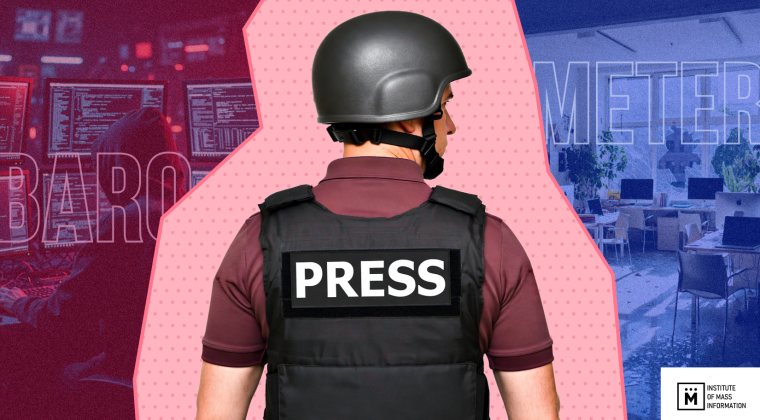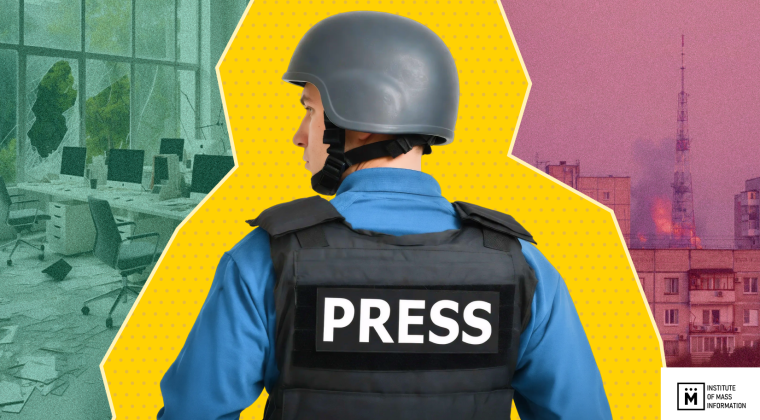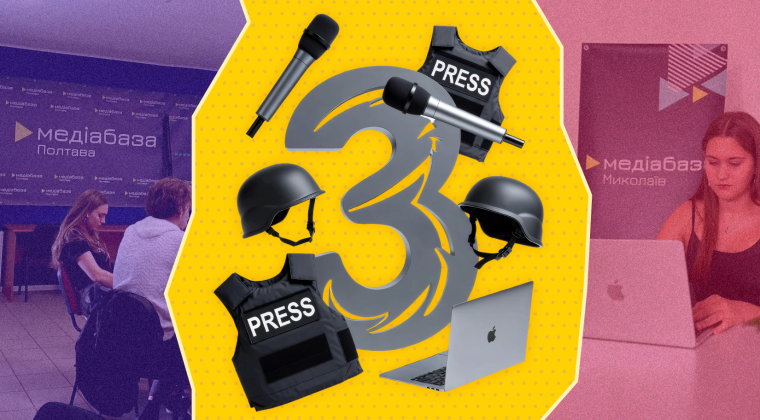Russian propaganda is considered a key weapon in the Kremlin’s war against Ukraine. Since Russia invaded Ukraine on 24 February, the Kremlin has used its control of the news media to justify its war as defensive, a necessary response to western efforts to destroy Russia.
On 20 October, in his TV program – The Antonyms – on RT Russia, Kremlin propagandist Anton Krasovskiy called for drowning Ukrainian children and burning them in their homes.
Krasovskiy’s fans and Russians, who regularly watch state-funded Russian TV, were not surprised by his violent calls. In January 2022, Krasovskiy had already threatened to burn Ukrainians on vul. Khreshchatyk along with the Ukrainian Constitution.
After the Vinnytsia missile strikes in July 2022, which killed 23 people, including three children, Krasovskiy firmly stated that “Vinnytsia is not enough”, and voiced his hope for a “final solution. A real, military one”.
Ukraine’s Institute of Mass Information (IMI) underlines that genocidal rhetoric against Ukraine and Ukrainians is commonplace in Russian information space. TV and radio programs voicing statements similar to Krasovskiy’s are not an exception, but part of the Russia’s sophisticated propaganda system.
Krasovskiy’s comments sparked outrage inside and outside Russia, and he was temporarily suspended by RT editor-in-chief Margarita Simonyan. Krasovskiy apologized, justifying his behaviour on his Telegram channel.
“Listen, I’m truly embarrassed that I somehow didn’t see the limits. About the children. But it happens like this: you’re in the middle of a broadcast, and you get carried away. And you can’t stop.”
IMI experts have analyzed how often Kremlin propagandists call for the destruction of Ukrainians and why the “Krasovskiy affair” is actually a pattern, and not at all an accidental occurrence. Moreover, since the start of the full-scale war, the rhetoric has changed, becoming more virulent and aggressive.
What is genocidal rhetoric and how effective is it?
According to Article 2 of the UN Convention on the Prevention and Punishment of the Crime of Genocide, genocide refers to “any acts committed with intent to destroy, in whole or in part, a national, ethnical, racial or religious group as such”. Such acts include:
- Killing members of the group;
- Causing serious bodily or mental harm to members of the group;
- Deliberately inflicting on the group conditions of life calculated to bring about its physical destruction in whole or in part;
- Imposing measures intended to prevent births within the group;
- Forcibly transferring children of the group to another group
Genocidal rhetoric incites people to carry out such actions. The number of victims during the genocide in Rwanda in 1994 is about 800,000 people. Basing their arguments on the indictment dated 01.03.2021 against Félicien Kabuga, the Rwandan multimillionaire and primary financier of the Hutu extremist outlets (Radio Télévision Libre des Mille Collines (RTLM) radio station and Kangura magazine), IMI has transposed the definitions to the context of Russia’s propaganda discourse against Ukraine.
They include:
- Direct calls for the destruction or commission of genocidal acts, such as strikes on civilian infrastructure, kidnapping of Ukrainian children, extermination of Ukrainians.
- Using euphemisms, softening words or expressions to conceal what is really happening and downplaying the scale of the tragedy and the nature of war crimes, as such. Russian propagandists have developed a whole new discourse to describe the invasion of Ukraine, justifying that Russia was only protecting its citizens and territories (“if we don’t kill them, then they’ll kill us” / “we had no other choice”).
- Euphemisms dehumanizing the victim group. Rwandan radio called the Tutsis “cockroaches that must be destroyed”. Russian propagandists call Ukrainians “Nazis, fascists, rats, worms” that must be eliminated.
- Sacralizing war, using religious narratives and theological concepts. Justifying crimes through so-called good intentions, which are blessed by religion, church leaders. Using epithets such as “a sacred war”; in Russia’s case – “desatanization of a soulless Ukraine”.
- Ignoring genocidal calls in official statements. The Russian media seemingly ignores such discourse, thus condoning and inciting the Kremlin authorities to continue.
- Favourable (or neutral) media coverage of genocidal-type acts that have been committed. Rwandan radio glorified violence and attacks against the Tutsi, celebrated the killings, glorified the killers and encouraged them to continue. Similar rhetoric can be found in Russian media.
- Lack of balance and impartiality in media content. Incitement to commit genocide can be direct but also implicit, that is, the context of media discourse must be taken into account if it is not a blatant call to kill and destroy.
The role of Rwanda’s media in inciting genocide was legally recognized, and the prosecution also mentions the use of psychological preparation of the population to commit genocide (incitement).
British lawyer Philip Sands, who has experience in the International Court of Justice and the European Court of Human Rights, states that he sees obvious signs of Russian genocidal rhetoric towards Ukrainians.
“I see signs of genocidal rhetoric, but proving genocide in law, under the 1948 Convention, is tough. I think there is evidence of war crimes, and of crimes against humanity, which to my mind are no less grave than genocide.”
As Russia’s full-scale war against Ukraine continues, it is difficult to assess the exact impact of Russian propaganda directed against Ukrainians.
But, today, it is possible to trace a correlation between public consumption of Russian propaganda and the degree of support for the war against Ukraine.
Mikhail Sokolov, Russian sociologist, professor at the Faculty of Political Science and Sociology at the European University in St. Petersburg, says that among the Russians who watch TV daily, 79.5% approve of the full-scale invasion, and among those who are not interested in TV – 36.4%.
Sokolov bases his statements on the opinion polls conducted by the All-Russian Center for Public Opinion Research. Of course, it should be noted that this center is a state institution, that is, there is no guarantee that the published results are true.
However, we can compare these figures with the data published by the non-governmental research institute – Levada Analytical Center – on where Russians get their information and what sources they trust. As of the end of June 2022,
- 63% of Russians get their information from television
- 39% from social networks, 32% from online publications,
- 16% from telegram channels.
In addition, 50% of Russians say that they trust television news reports the most.
According to the Levada Center, as of October 22, 73% of Russians supported the actions of the Russian military in Ukraine.
How Russian propaganda intensifies genocidal rhetoric against Ukraine and Ukrainians
At the beginning of Russia’s full-scale invasion of Ukraine, the Kremlin propagandists continually repeated a mantra that the Russian army would only target military sites, and thus “save” ordinary Ukrainians from some mythical “Nazis”.
The invasion was mostly justified by the urgent need to carry out the so-called “denazification” of Ukraine.
For example, during the TV program Vesti Nedeli of 27 February on the state channel Russia-1, host Dmitry Kiselyov tried to justify the beginning of the so-called “special operation” by claiming that Kyiv divides people into sorts and classes.
“Only military sites are destroyed. Our military does not target civilians and cities.” Kiseliov alleged.
Further, Kiselyov talked about “Ukrainian killer squads” who allegedly tortured people in the Donbas, and claimed that impunity flourishes in Ukraine.
He referred to Ukraine and Russia as “one divided nation”, and Ukrainians who openly profess their national identity were portrayed as “tainted Russians”, who are incited by NATO to hate Moscow.
Instead, Kiselyov spoke of Russia as a country with a mission, one that had undertaken the ungrateful and difficult job of “eradicating Nazism” for the public good.
“The purpose of the Russian special operation in Ukraine is to prevent a global war. It’s essentially an anti-war action. In fact, NATO’s aggressive expansion towards Russia prompted us to propose a new global security architecture. But, as the West decided to abandon all diplomatic relations, we were forced to prevent a major war through the forced demilitarization of Ukraine,” explained Kiseliov.
For her part, RT editor-in-chief Margarita Simonyan wrote in a telegram post on 24 February that she was very concerned about Ukrainian civilians suffering in this “denazification” process.
On 26 February, Kremlin propagandist Vladimir Solovyov stated on his program – Solovyov LIVE – that “war is always bad”.
He then called on all Russians not to worry about the sanctions, but to remember that Russia was engaged in the “liberation” of the Donbas and of Ukraine as a whole.
Subsequently, Solovyov called the President of Ukraine Volodymyr Zelenskyy a “drug addict” and accused him of being indifferent to the events.
Solovyov tried to justify his statements by showing the speech of propagandist Andrei Tkachev, who calls himself a protopriest of the Russian Orthodox Church and is the host of the state pro-Kremlin TV channel Spas.
“The war has not begun, the war is ending. Whoever doesn’t know that it’s started and has been ongoing for a long time is a foolish bastard! The Maidan and its organizers are to blame! Because of the huge Euro-Atlantic mess and all the people that are linked to it here! Those who destroyed the beloved country where I used to live!” Tkachev said.
Russia began using some genocidal rhetoric techniques and narratives during the preparation of the war in the Donbas in 2014.
However, today, we can observe a rise in aggressive rhetoric, extremism, direct calls for war and a tendency in Russian information space to blur the boundaries between those who are considered enemies (“Nazis”) and all Ukrainians.
Earlier, Russian media referred only to the Ukrainian military and government officials as “Nazis” and “terrorists”, but today, Russian propaganda tries to demonize the entire Ukrainian population… and “demonize” in the literal sense of the word.
Recently, the Assistant Secretary of the Security Council of the Russian Federation Alexei Pavlov invented a new term to justify the war crimes of the Russian army in Ukraine – so-called “desatanization”.
He claimed that the Kyiv regime had allegedly turned Ukraine into a “totalitarian hyper-sect” and forced its citizens to abandon the values of the Orthodox faith, Islam and Judaism.
So now, says Pavlov, the Russian Federation must fight not only against some mythical “Nazis”, but also against phantom “satanists” and “militant fanatics”.
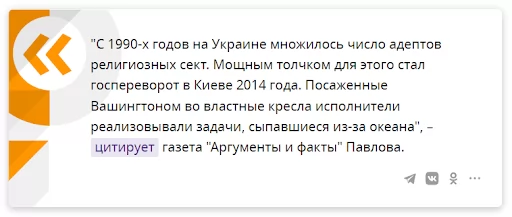
“In the 1990s, there was a huge increase in followers of religious sects in Ukraine. In 2014, the coup in Kyiv gave these movements an even stronger impetus. The new, Washington-led rulers of Ukraine duly performed the tasks issued by their masters from across the ocean.” Pavlov cited by Argumenty and Fakty magazine. Screenshot from Radio Sputnik website.
On October 25, the president of Chechnya Ramzan Kadyrov also declared a jihad and called on all devout Moslems to fight the spread of “satanism” in Ukraine.
In all probability, the intensification of genocidal rhetoric is linked to the Russia’s failure to advance and lack of military successes at the front and Ukraine’s successful counter-offensive and liberation of some Ukrainian territories.
Pseudo-historical arguments: “ex-Ukrainian SSR” and salvation from “external control”
The above are examples of Russia’s genocidal rhetoric against Ukraine and Ukrainians.
First of all, in order to justify its intention to destroy a sovereign state and an entire nation, Russia talks about Ukraine as if it were a non-existent entity.
This argument stems from pseudo-historical fables about the formation of Ukraine of Ukraine, as well as the Kremlin’s attempts to appropriate the history and culture of Kyivan Rus and the Kremlin’s narratives about “one people” or “a divided nation”.
It is worth noting that another infamous narrative about the “brotherly nation”, which propagandists once used to the hilt, has hardly been heard in Russian information space since the beginning of the full-scale Russian invasion.
The content of the federal news agency REGNUM is also a striking example of Russia’s denial of the very fact of Ukrainian statehood.
When covering current events in Ukraine, the resource partly uses the term “ex-USSR” or “former USSR”, thus correlating with Russia’s expansive policy, which positions the Russian Federation as the successor of the Soviet Union.
How is this done?
- In attempting to justify the attack on Ukrainian sovereignty, Russian propaganda usually portrays Ukraine as an object rather than a subject of international law. That is why the Russian Federation constantly says that Ukraine is allegedly governed by the West, while many historical events related to Ukraine’s stand for freedom, such as the different Maidan protests, are seen as marginal actions led by external players.
- Hate speech is an integral part of genocidal rhetoric. It is a way to dehumanize the enemy and use deceptive words to distort reality. Russian propaganda has developed a whole new “newspeak” that helps justify the criminal actions of the Russian Federation. Thus, the full-scale war in the eyes of an average Russian, who avidly consumes state information resources, is a local “special operation”, which calls for immediate “denazification”. The invasion, accompanied by murder, torture and rape, is called “liberation”, “rescue” or “cleansing” from “Nazis”, “fascists”, “satanists”, “Banderites”, “Ukrainian military killing squads”, etc.
- Calls for strikes on civilian infrastructure as incitement to genocide. Today, Russian attempts to legitimize the murder of Ukrainian civilians and the missile strikes on urban infrastructure in retaliation of the 8 October bombing of the Kerch Bridge, which the Russian FSB blames on the Ukrainian special services. Russia is once again trying to make Ukraine look guilty of provoking this war. Such extreme statements have been actively spread by Vladimir Soloviov and Anton Krasovskiy. In accordance with the third article of the UN Convention on the Prevention and Punishment of the Crime of Genocide, such calls for extreme action fall under “direct and public incitement to commit genocide”, which, says the legal analysis of the American Institute for Strategy and Policy New Lines, is considered a separate crime regardless of whether the calls lead to genocide or not.
On 17 October, Anton Krasovskiy posted a cynical message in telegram about a massive suicide drone attack on Kyiv, killing four people, including a pregnant woman.

“Kyiv got it hard. That’s great. Now where’s your constitution?” Screenshot from Anton Krasovskiy’s telegram.
Aleksandr Kots from Komsomolskaya Pravda, who positions himself as a war correspondent, also called for launching strikes on infrastructure facilities in Ukraine. Kots, Solovyov and Krasovsky have been sanctioned by Canada, the United Kingdom, Australia and others.
However, the bloodthirsty host of the Komsomolskaya Pravda radio broadcast Sergey Mardan has not yet been sanctioned and continues to freely stream his Morning Mardan podcasts on Apple Music.
“You know, it’s really quite funny: these aren’t Iranian Shahed drones, but just something our good Iranian partners have taught us to build – our own Geran drones from lawn mowers. I don’t care what it’s called: the beautiful Arabic word Shahed or the beautiful Russian word Geran (Geranium)… as long as it flies and falls on the heads of the khokhols (derogatory term for Ukrainians)!!!” said Mardan after the Russian attacks on Ukrainian cities with suicide drones.
In addition to emotionally cynical posts inspired by the killing of Ukrainians or strikes on critical infrastructure, Russian propagandists also publish information on telegram channels about the expediency of such actions to legitimize Russian crimes.
Until recently, Russian propagandists, such as Andriy Filatov, a military correspondent for state-run RT, posted stories allegedly pitying Ukrainian civilians and spreading fakes that the Ukrainian Armed Forces were to blame for the shelling.
Today, many Russian information resources openly say or write that it is the Russian army that shells and bombs Ukrainian civilians, and that this is unavoidable.
Filatov now posts about “the need for systematic strikes not only on the country’s energy infrastructure, but also on the transport infrastructure”. And Kots allegedly shares the thoughts of his subscribers, who call for the destruction of the Ukrainian power system itself.
Today, Russian propagandists focus on the technique of distortion and concept substitution. Thus, the shelling of critical infrastructure facilities and the murder of power plant workers are not described as a deliberate means to terrorize civilians and weaken their resistance, but as the disabling of facilities that serve the “enemy military machine”.
That is, civilian objects and civilians are actually equated with the military. Such narratives can be seen in Kots’s columns for Komsomolskaya Pravda, which are re-posted in the RT telegram channel with a disclaimer that “the author’s opinion does not express the opinion of the editorial board”.
In fact, Russian propagandists have been encouraging murder and terror tactics on Ukrainian civilians, including attacks on vital infrastructure, even before the events of 8 October.
For example, back in August on his Komsomolskaya Pravda broadcast, Sergei Mardan reacted to the story that Ukrainian teachers in the temporarily occupied territories of Zaporizhzhia Oblast refused to teach by the Russian program and planned to conduct online lessons according to the Ukrainian curriculum:
“Take away their credit cards and make them eat them! What else?… Evict them from their apartments. Well, or something like our good old Gulag, for example! If they’re waiting for the Gulag – give them the Gulag!” Mardan urged.
As mentioned above, Anton Krasovskiy has made several odious statements about Ukrainian children. On the pro-Kremlin channel Union, which broadcasts from temporarily occupied Donetsk, he talked about the value of the lives of Russian (meaning Ukrainian children in the Russian-occupied territories) versus those of Ukrainian children.
“Everyone’s afraid to admit that our children are dearer to us. Because they’re ours. When we re-conquer these lands and the children become Russian, then we’ll protect them. In the meantime, Kyiv, Lviv and Zhytomyr should be afraid, and not Donetsk or Kherson,” said Krasovskiy.
On 8 August, RT editor-in-chief Margarita Simonyan posted about how much she dreams of striking the bridges that cross the Dnipro River.
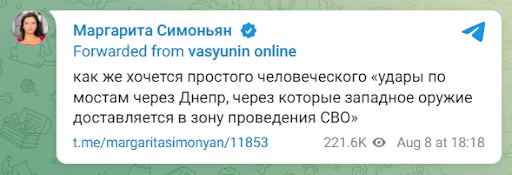
“I’d just love to see a simple, but super-strong strike on some Dnipro bridges, across which western weapons are being delivered to the special operation zone!” Screenshot from Margarita Simonyan’s telegram.
Finally, Russian soldiers, who are portrayed as “warriors of light”, “heroes” and “liberators”, by the Russian media, also express noxious opinions on Ukrainian civilians. For example, on 14 July, Russian soldier Anatoliy Dremov called to bomb schools, maternity hospitals and residential buildings. However, he quickly deleted this post.
For his part, Maksim Fomin, who is fighting in one of the illegal armed groups of Russia’s proxy “Donetsk People’s Republic”, calls himself a military commander and blogs under the pseudonym Vladlen Tatarskiy, on 12 September posted that Ukraine’s infrastructure must be totally destroyed.
On 30 September, the Russian government honoured Fomin by allowing him to attend the signing of the so-called “agreements” on the Russian annexation of the occupied territories of Kherson and Zaporizhzhia oblasts – a replay of Russia’s “recognition’ of the occupied territories of Donetsk and Luhansk oblasts on the eve of the full-scale invasion. After the event, Fomin-Tatarskiy recorded a video message in which he promised the following: “We will defeat everyone! We will kill everyone! We will steal everything we need! We’ll get everything we want! Forward, God willing!”
Conclusion
In conclusion, we can but say that Russia has been using genocidal rhetoric against Ukrainians for a very long time.
The only thing that has changed is the scale of its belligerence: from the narrative of Russia being forced to attack in order to save the Russian-speaking population of Ukraine and protect itself to direct calls to destroy Ukraine and kill Ukrainians.
There is still much work ahead for researchers, human rights activists and law enforcement.
It is essential to assess the role of Russian propaganda in inciting the genocide of Ukrainians, in waging an aggressive and extremely brutal war against Ukraine, and in violating the sovereignty and territorial integrity of Ukraine.
By giving a true assessment of these extremist statements repeated ad nauseam by Russian propagandists, the international community will be able to bring all the accomplices of these crimes to justice and duly punish them.
Article by: Aliona Nesterenko, IMI media expert; Roman Holovenko, head of IMI legal department; Oksana Romaniuk, IMI executive director

